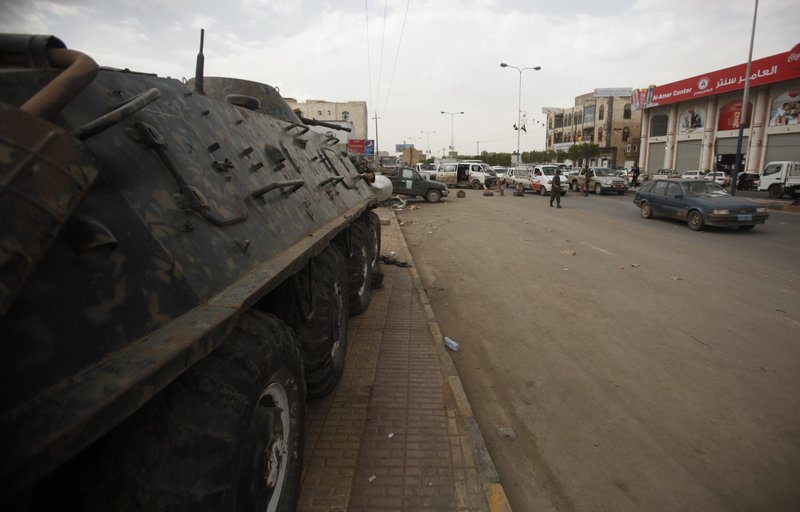SANAA, Yemen — Yemen was thrust back into the forefront of the international fight against terrorism Tuesday when the U.S. and Britain evacuated embassy staff due to a threatened attack, a suspected U.S. drone killed four alleged members of al-Qaida, and militants shot down a Yemeni army helicopter.
As Westerners flew out of the country, Yemeni authorities launched a wide investigation into the al-Qaida threat to multiple potential targets in the impoverished Arab nation. Security officials said they believed the terror network was seeking retaliation for a U.S.-backed military offensive that has dealt serious setbacks to the terror network’s most active branch, including the death earlier this year of its No. 2 leader.
The Yemeni army, meanwhile, surrounded foreign installations, government offices and the airport with tanks and troops in the nation’s capital, Sanaa, as well as the strategic Bab al-Mandeb straits at the entrance to the Red Sea in the southern Arabian Peninsula, drawing parallels with security measures following the 2000 bombing of the USS Cole in Aden harbor that killed 17 American sailors.
Authorities also set up checkpoints across Sanaa, searching cars and individuals, especially after night fell. Top government officials, along with military and security commanders, were told to stay vigilant and limit their movements.
Although the immediate threat seemed to be focused on Yemen, the U.S. has temporarily shut down 19 diplomatic posts in the Middle East and Africa. A U.S. intelligence official and a Mideast diplomat told The Associated Press that the closures were triggered by the interception of a secret message between al-Qaida chief Ayman al-Zawahri and Nasser al-Wahishi, the leader of the Yemen-based al-Qaida in the Arabian Peninsula, about plans for a major terror attack. Zawahri also made a public statement on July 30 that exhorted Muslims to kill Americans “in every spot on Earth.”
Yemeni investigators looking into the threat said they believe the motive of the attack was retaliation for the killing of Saudi-born Saeed al-Shihri, who was released from the U.S. prison in Guantanamo Bay after nearly six years and later became the No. 2 al-Qaida leader in Yemen. Al-Shihri was critically wounded in a November drone strike and later died of his wounds, the militant group acknowledged.
The terror network has suffered a series of setbacks after the military launched an offensive in June with the help of U.S. forces that has succeeded in uprooting it from strongholds in the south. The group had taken advantage of the instability after the Arab Spring wave of revolutions that led to the resignation of Yemen’s longtime leader, Ali Abdullah Saleh.
Yemen’s current president, Abdo Rabby Mansour Hadi, met with President Barack Obama at the White House last week, where both leaders cited strong counterterrorism cooperation.
Pentagon Press Secretary George Little said the U.S. Air Force transported State Department personnel out of Sanaa early Tuesday. The department said in a travel warning that it had ordered the departure of non-emergency U.S. government personnel “due to the continued potential for terrorist attacks,” adding that U.S. citizens should leave immediately because of an “extremely high” security threat level.
A senior defense official said that between 50 and 100 diplomatic personnel were flown from Sanaa in a military transport to Ramstein Air Base in Germany. The official was not authorized to discuss the information publicly and spoke on condition of anonymity. The official said dozens of military troops remain in Yemen, including those providing security at the embassy and others training Yemeni troops.
Britain’s Foreign Office also said it evacuated all staff from its embassy due to increased security concerns. The Foreign Office said the staff were “temporarily withdrawn to the U.K.” And the Dutch Foreign Ministry has issued a call for about 40 of its citizens to leave Yemen, although it did not say whether that included its six embassy workers.
Yemen’s government criticized the evacuations in a statement from its embassy in Washington, saying the diplomatic withdrawal “serves the interests of the extremists and undermines the exceptional cooperation” between Yemen and the international community in fighting terrorism.
Send questions/comments to the editors.



Success. Please wait for the page to reload. If the page does not reload within 5 seconds, please refresh the page.
Enter your email and password to access comments.
Hi, to comment on stories you must . This profile is in addition to your subscription and website login.
Already have a commenting profile? .
Invalid username/password.
Please check your email to confirm and complete your registration.
Only subscribers are eligible to post comments. Please subscribe or login first for digital access. Here’s why.
Use the form below to reset your password. When you've submitted your account email, we will send an email with a reset code.